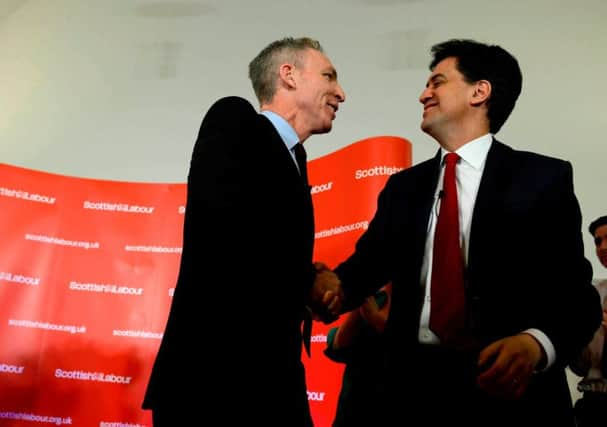Andrew Whitaker: Ed rules if Labour sups with SNP


LABOUR’s leadership at both UK and Scottish levels has scarcely been able to have a public conversation without being invited to speculate on potential deals with the SNP in the event of a hung parliament in which Ed Miliband is leader of the biggest party.
Mr Miliband last week played the cards dealt to him as best he could by ruling out the prospect of a formal coalition government with nationalist politicians taking ministerial posts – something that was in truth always a no-go.
Advertisement
Hide AdAdvertisement
Hide AdOf course, that won’t be the end of the matter and Mr Miliband will continue to face questions about the chances of an informal confidence and supply deal, with the SNP agreeing to vote with Labour in the Commons in exchange for conceding key demands such as easing austerity and perhaps even scrapping Trident.


Mr Miliband is wise not to completely tie his own hands in the event of a minority Labour government being forced to rely on other parties to get its legislation through the Commons.
But should the scenario play out whereby Labour has to negotiate with the SNP, Greens or even the Liberal Democrats, how would such negotiations proceed?
Perhaps a very pertinent question is how much say Scottish Labour leader Jim Murphy would have in any such talks. After all Mr Murphy has already declared his independence from the Labour leadership at Westminster, stating: “Decisions on what the Scottish Labour Party does are for the Scottish Labour Party. I’m not going to seek permission or seek approval from anywhere else in the UK.”
But if the election delivers an indecisive outcome on 7 May and Mr Miliband is forced to deal with a bulked-up SNP presence in the Commons, is it really likely that Mr Murphy will have any real say over what’s decided?
Picture frantic negotiations, with Labour having squeaked through as the largest party, with just a handful of seats more than the Tories – perhaps even with a number that is only in single figures.
David Cameron remains ensconced in 10 Downing Street, while Mr Miliband attempts to form a government and secure assurances from smaller parties that at the very least they will vote with Labour in the Commons and not bring an early end to his premiership.
It’s easy to imagine Mr Salmond revelling being centre of attention in such a frenetic atmosphere and piling the pressure on Mr Miliband to make concession after concession to the SNP.
Advertisement
Hide AdAdvertisement
Hide AdMr Salmond’s election as MP for the Gordon constituency on 7 May would see the former First Minister return to the Commons after a five-year absence and back in the Westminster hothouse – a place in which he feels instinctively at home, ready to wheel and deal with political allies and foes alike.
Mr Miliband is far too astute to simply ignore Mr Murphy during such talks, but whether the East Renfrewshire MP will be a key player remains to be seen.
Given the likelihood that the Scottish Labour leader is set to preside over significant losses to the SNP that could leave the party with a rump of MPs in Scotland, just how much of a position will Mr Murphy be in to call the shots?
Mr Murphy is unlikely to be one of Labour negotiators for talks with other parties, with shadow foreign secretary Douglas Alexander, the party’s election campaign supremo, Labour’s campaign vice-chair Lucy Powell, who managed Mr Miliband’s leadership campaign, and perhaps deputy chair Jon Trickett – a voice of the Left in the shadow Cabinet – likely to make up the team.
There’s also Mr Murphy’s oft-stated intention to stand for election to Holyrood in 2016, meaning the Scottish Labour leader’s days at Westminster are numbered.
It may cross Mr Miliband’s mind to make Mr Murphy Scottish Secretary – a position held by the Scottish Labour leader under Gordon Brown – on a short-term basis.
But once again, given the drubbing Labour is likely to take in Scotland on 7 May at the hands of the Nationalists, handing Mr Murphy such a role for whatever reason would allow Mr Salmond and Nicola Sturgeon to throw punches at Labour for making the leader of the party rejected by Scots the UK Cabinet lead for Scotland. But whether Mr Miliband opts to give Mr Murphy a role or not should he end up occupying 10 Downing Street, it’s still highly unlikely the Scottish Labour leader would have much say in any talks with other parties.
The Nationalists would surely again make the point that having been heavily defeated in Scotland and possibly having only narrowly squeaked back in his own constituency, Mr Murphy should not then emerge as a power broker for the UK as whole.
Advertisement
Hide AdAdvertisement
Hide AdIt’s more than likely given the politics of grievance often associated with the SNP’s leadership and Mr Salmond’s propensity to pick fights that the Nationalists would find a way of falling out with a minority Labour government one way or another somewhere down the line.
However, the harsh reality of emerging as leader of the biggest party, but well short of an overall majority, would see Mr Miliband forced to make some sort of confidence and supply agreement with the SNP, if as polls suggest it wins 30-plus seats.
Even though the SNP is very clearly playing games by suggesting that a Nationalist vote is a vote for a Labour government, and would be likely to play similar games with Mr Miliband in office, the prospect of allowing the Tories to remain in power with the turbocharged austerity that would bring could well force the Labour leader’s hand.
There could still be talks aimed at a deal between Labour and the Lib Dems in a hung parliament scenario, but if Nick Clegg’s party is also reduced to a rump, it may not have that much to bring to the table.
All of which points to Mr Miliband having to deal with the SNP, as unpalatable as that is for many in his party, simply to protect working-class people from a more extreme version of the last five years of coalition.
Of course, this could be where an astute Labour negotiating team could come into its own. Labour could easily outflank the SNP on the centre-left by declaring publicly at the start of any talks with the Nationalists that it needed to be sustained in office to deliver a social justice agenda and that any suggestion of bringing down a Labour government would be helping the Tories.
FOLLOW US
SCOTSMAN TABLET AND MOBILE APPS